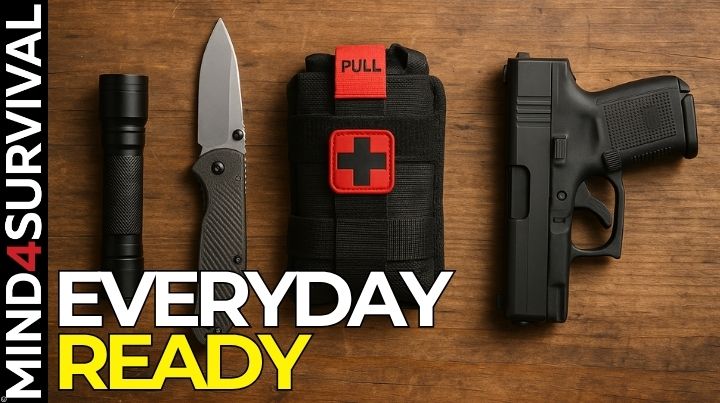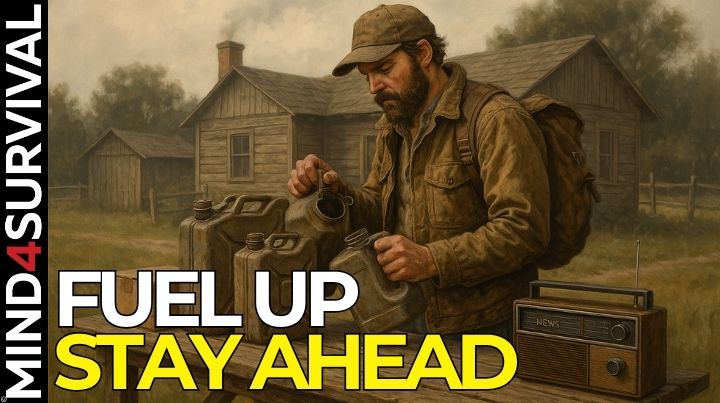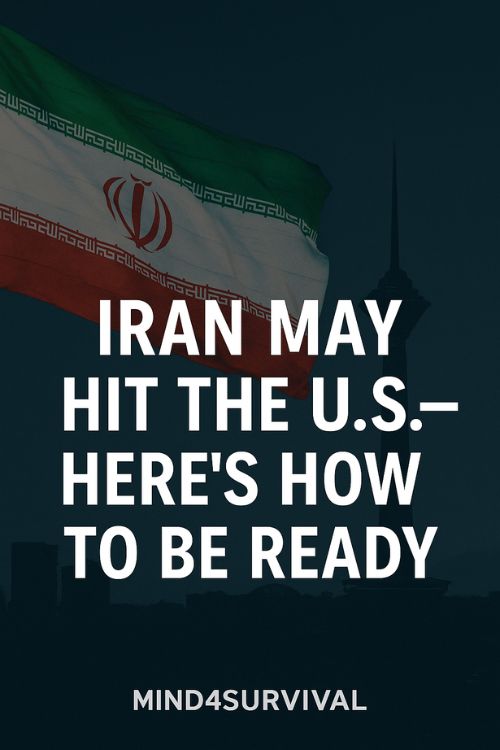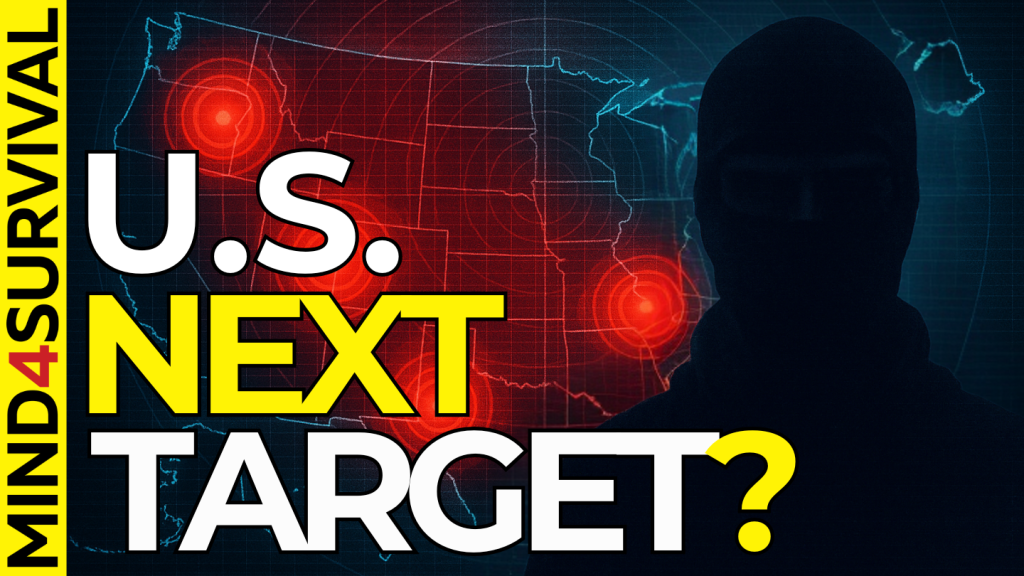What if the next terror attack on U.S. soil doesn’t come from who you think it will? What if the fuse has already been lit—and the target is much closer to home than most people realize?
We’re standing at a moment that could spiral in any number of directions. And while most of us can’t influence foreign policy, we can influence how prepared we are. That’s why I recorded this episode of the Mind4Survival podcast: to cut through the noise and help you sharpen your mindset, improve your situational awareness, and take simple steps that make you safer and stronger.
TL;DR: Tensions with Iran could escalate into attacks or supply chain disruptions that affect everyday Americans. You can’t control what world leaders do—but you can control how prepared you are. Stay aware, gear up smart, and don’t let fear hijack your mindset. This is about readiness, not panic.
Quick Look at What You’ll Learn
It All Comes Down to One Question
No matter where you fall politically, there’s only one question that truly matters right now:
What will the Iranian government—or the groups they support—do next?
That’s it. Everything else is noise. If Iran escalates, it could lead to terror attacks, supply chain disruption, military conflict, or civil unrest. And we’ve seen how this movie plays out before.
I know, because I was there.
I spent over a decade in the Middle East, including 2,000+ days on the ground in Iraq. I ran the guard force at the U.S. Embassy in Baghdad—the largest embassy in the world. I worked alongside people who were directly targeted, wounded, and killed by Iran’s Quds Force. I’ve seen the results of their playbook up close. I’ve lived the “what ifs” you’re now seeing hinted at in the news.
And I’ve also had to work hard to not hate the people behind it.
Why Mindset Matters
When I say “mindset,” I’m not talking about just being tough. I’m talking about being clear. Being rational. Being calm under pressure.
If you let anger or fear dominate your thinking, you lose your edge. Hate, especially, is corrosive. It clouds your ability to make good decisions—which is the last thing you need in a crisis.
That’s why I work to understand Iran’s motivations, even if I don’t agree with them. Understanding gives you better predictive power. If you know what someone’s likely to do, you can better prepare for it. That’s the foundation of real situational awareness.
The Historical Context Most People Ignore
To understand Iran’s posture today, you have to understand their past.

It didn’t start in 1979 with the hostage crisis. It started back in 1925, when the British installed Reza Shah—a dictator with clear admiration for the Nazis. He modernized the country, yes—but he did it through censorship, violence, and repression. Then in 1953, after Iranians democratically elected Mohammad Mosaddegh, the U.S. and British orchestrated a coup and reinstated the Shah. That was the CIA’s Operation Ajax.
So, by the time the Islamic Revolution kicked off in 1979, resentment toward the West had been simmering for decades.
Then came the Iran-Iraq War (1980–1988)—one of the most brutal, underreported wars of the 20th century. Over a million people died. And guess what? The U.S. supported Saddam Hussein, passing him intel even while he was dropping chemical weapons. Meanwhile, we were also selling arms to Iran under the table. That turned into the Iran-Contra scandal.
Is it any wonder why a lot of Iranians look at the U.S. as the enemy? Again, that’s not to justify anything they do—but if you want to understand your enemy, you need to see the world through their eyes.
What Could Happen Now
Right now, everything’s on the table.

-
Iran could escalate with missiles or cyberattacks.
-
Proxy groups could hit soft targets in Europe—or even inside the U.S.
-
Economic pressure could trigger more supply chain issues.
-
We could end up in a broader war that sends U.S. troops back into combat zones.
This isn’t fearmongering. This is informed realism.
We have military installations, consulates, and diplomatic missions ringing Iran. From a strategic perspective, they’re high-value targets—and that makes the people inside them incredibly vulnerable.
If you’re living in the U.S., you may think you’re far away from the action. But if something pops off, the effects will ripple into your life in ways you won’t be able to ignore—at the gas pump, in the grocery store, and maybe even in your local community.
What Should You Do?
Here’s what I recommend, broken down into practical steps:

1. Situational Awareness
When you go out, do a quick risk-vs-reward check. Is this venue or event a high-profile target? Think it through.
When you enter a building, immediately identify two exits. Mentally rehearse your actions in case something goes wrong.
If a threat shows up, don’t freeze. Act. Move. Fight if you have to.
2. Gear & EDC
You don’t need to become a walking armory, but you do need to carry smart. If you have a concealed carry permit—use it. If you don’t want to carry a gun, fine. But carry something. A light, a knife, a tourniquet. Something that can help you survive or save a life.
3. Check Your Supplies
If conflict escalates, fuel prices will go up. Supply chains will tighten. Go grab an extra fuel filter, pick up some staples, and top off your food and water stores.
Don’t go broke panic buying—but don’t wait until the shelves are empty either.
4. Watch for Government Overreach
Historically, war = expanded government power. We saw it after 9/11 with the Patriot Act. We’ll see it again if this escalates. Stay alert, ask questions, and protect your rights.
5. Take Care of Yourself
Don’t let the noise grind you down. Limit your exposure to the news cycle. Talk to a trusted friend. Walk away from the screen and get outside.
Your intuition matters. If something doesn’t feel right, listen to that. And help others do the same.
The Bottom Line
You don’t need to predict the future. You need to prepare for it.
You’re not doing this because you want something bad to happen. You’re doing it so you can live a good life no matter what happens. So acknowledge the risks. Take action. And then go live your life.
We prepare so we can be free—not so we can be afraid.
And remember: you’re just one prep away from being better prepared.
Additional Resources

Read the full article here


